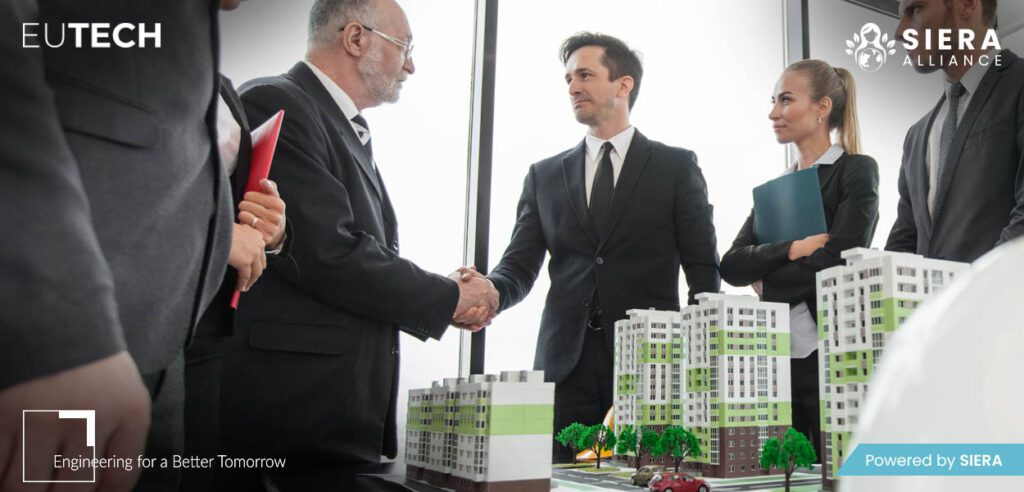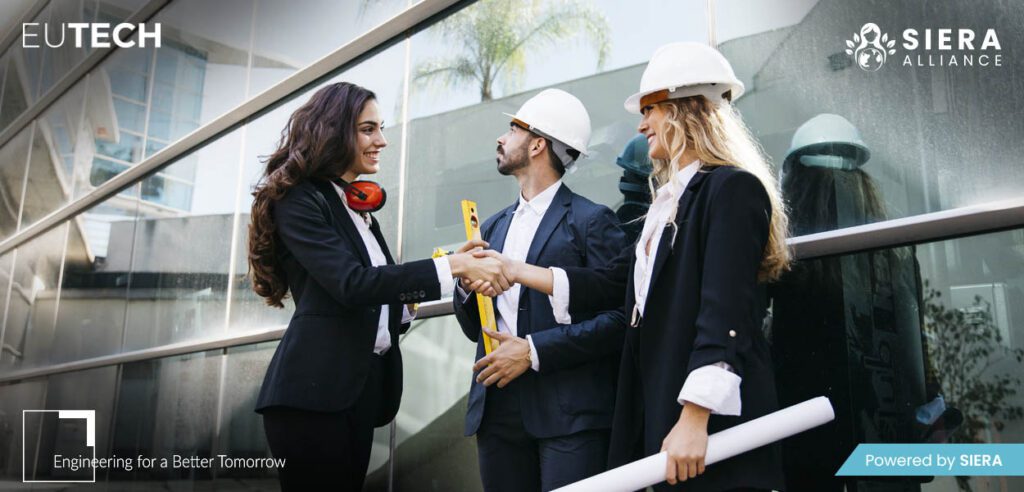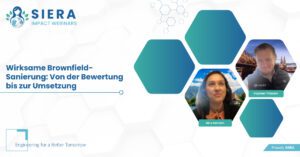On 3rd September 2024, EUTECH powered by SIERA Alliance hosted an insightful webinar titled “Integrating Governance Values and Ethical Practices in Construction.” Moderated by Dr. Igor Gladkov, Director at the European Technology Chamber, the session provided a platform for experts to discuss embedding robust governance frameworks and ethical standards in the construction sector.
Key Challenges in Governance and Ethics in the Construction Industry
The construction industry faces unique challenges in incorporating governance and ethical practices that meet evolving standards and societal expectations. During the webinar, panelists Alberto Zancanella (Export Manager at DDCHEM), Dr. Najoua Zhar (Sustainable Development Expert at the Union of Arab Chambers), and Hans Niemann (Senior Building Physics & Sustainability Engineer at Inhabit) highlighted several critical issues:
- Ensuring Comprehensive Governance for Sustainability: Many construction companies struggle to integrate sustainability into their governance frameworks, especially in embedding climate change mitigation and corporate social responsibility (CSR) into core decision-making processes. This gap emphasizes the need for sustainable construction practices that align with the Sustainable Development Goals (SDGs).
- Navigating Complex Regulatory Compliance: Compliance with environmental regulations is essential but challenging, as these regulations are continuously evolving. Panelist Dr. Najoua Zhar pointed out that maintaining a robust compliance system ensures companies uphold construction industry standards and avoid legal risks.
- Integrating Sustainability into Corporate Reporting: Standardized sustainability reporting frameworks help ensure transparency and accountability in climate-related disclosures. However, companies often face obstacles in achieving consistent reporting, which hinders stakeholder engagement and can affect corporate reputation.
- Managing Sustainability-Related Risks and Opportunities: Construction companies need to adopt risk management strategies that account for sustainability-related risks, including regulatory changes and environmental impacts. Alberto Zancanella noted that effective risk management strengthens a company’s resilience to market shifts and enhances its competitive edge.
- Encouraging Stakeholder Engagement and Collaboration: Effective stakeholder engagement is crucial for innovation and collaboration in sustainable projects. Hans Niemann emphasized that engaging stakeholders on sustainability issues helps build trust and fosters partnerships that drive sustainable development.
Practical Solutions and Recommendations
The panelists shared actionable solutions to help construction firms address these challenges, focusing on ethical practices and sustainable construction:
- Implementing a Comprehensive Sustainability Governance Framework: Embedding sustainability into governance structures is essential. Hassan Ammar highlighted that establishing a framework that incorporates anti-corruption measures, climate mitigation, and fair labor practices promotes ethical behavior across all levels of a project.
- Establishing Stakeholder Engagement Strategies: To build trust and foster collaboration, construction companies are encouraged to engage stakeholders through advisory panels, public consultations, and regular reporting on sustainability progress. This practice aligns with project management ethics and enhances transparency.
- Developing a Robust Compliance Management System: By implementing rigorous compliance systems, companies can better navigate complex regulations and uphold construction industry standards. Dr. Najoua Zhar stressed that proactive compliance management not only reduces legal risks but also strengthens the company’s reputation as a responsible industry leader.
- Adopting Standardized Sustainability Reporting Frameworks: Transparent reporting on sustainability efforts enables construction firms to demonstrate accountability and attract eco-conscious clients. Hans Niemann shared insights on how standardized reporting builds stakeholder confidence and promotes long-term partnerships.
- Creating a Comprehensive Risk Management Framework: A thorough risk management plan that incorporates sustainability-related risks is essential for companies to remain resilient. Alberto Zancanella discussed how a structured approach to risk management helps companies capitalize on new market opportunities while maintaining ethical standards.

Transformation Opportunities in the Construction Industry
Adopting ethical governance practices and transparent reporting creates transformative opportunities for construction companies, leading to competitive advantages and enhanced market presence:
| Transformation Area | Benefits | Impact |
| Enhanced Reputation | Builds trust with clients, investors, and regulatory bodies | Companies with strong governance frameworks enjoy a competitive edge and improved client retention. |
| Market Competitiveness | Aligns with SDGs and attracts eco-conscious clients | Firms that prioritize ethics in construction management can see a 20% increase in project bidding success. |
| Reduced Legal Risks | Minimizes potential penalties and maintains regulatory compliance | A proactive approach to compliance and regulations helps avoid costly fines and protects corporate reputation. |
| Stakeholder Confidence | Enhances long-term partnerships and opens new revenue opportunities | Transparent environmental impact reporting strengthens relationships with key stakeholders. |
| Employee Morale and Retention | Supports a positive work culture through workplace safety and ethical practices | Construction firms with strong fair labor practices report a 25% lower turnover rate compared to industry average. |
For more information on environmental engineering, sustainable construction practices and industry standards, visit SIERA Alliance, EUTECH, each committed to advancing sustainability in the construction sector.
Best Practices for Ethical Governance in Construction
The panelists shared best practices for construction firms to integrate governance values and ethical practices in their operations:
- Regular Stakeholder Consultations: Engaging communities, clients, and regulatory bodies ensures alignment with ethical and governance goals, building trust and reducing project opposition.
- Corporate Social Responsibility Initiatives: Implementing CSR programs and aligning with SDGs shows a commitment to the broader societal impact of construction projects.
- Transparent Reporting on Environmental Impact: Consistent and accessible reporting enhances accountability and builds a reputation as a sustainable company, attracting investors and eco-conscious clients.
Upcoming Events and Opportunities
Stay informed about future events. For more insights and networking opportunities, explore the SIERA Alliance Event Calendar. Join us as we continue to advance environmental engineering, technology and impact on environment and communities within sustainable construction.

Conclusion: Building a Responsible Future in Construction
As the construction industry evolves, prioritizing governance values and ethical standards is essential to support sustainable development and meet the expectations of clients, investors, and regulatory bodies. By fostering risk management, stakeholder engagement, and transparent reporting, construction firms can build a foundation for long-term success and societal impact. Partnering with organizations like SIERA Alliance empowers companies to integrate ethics into their governance frameworks, creating resilient, responsible, and future-ready projects.
To learn more about how Environmental Engineering services of SIERA Alliance can support your journey toward sustainable construction, visit our website.








